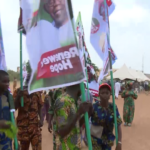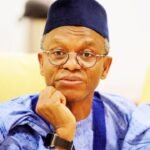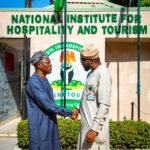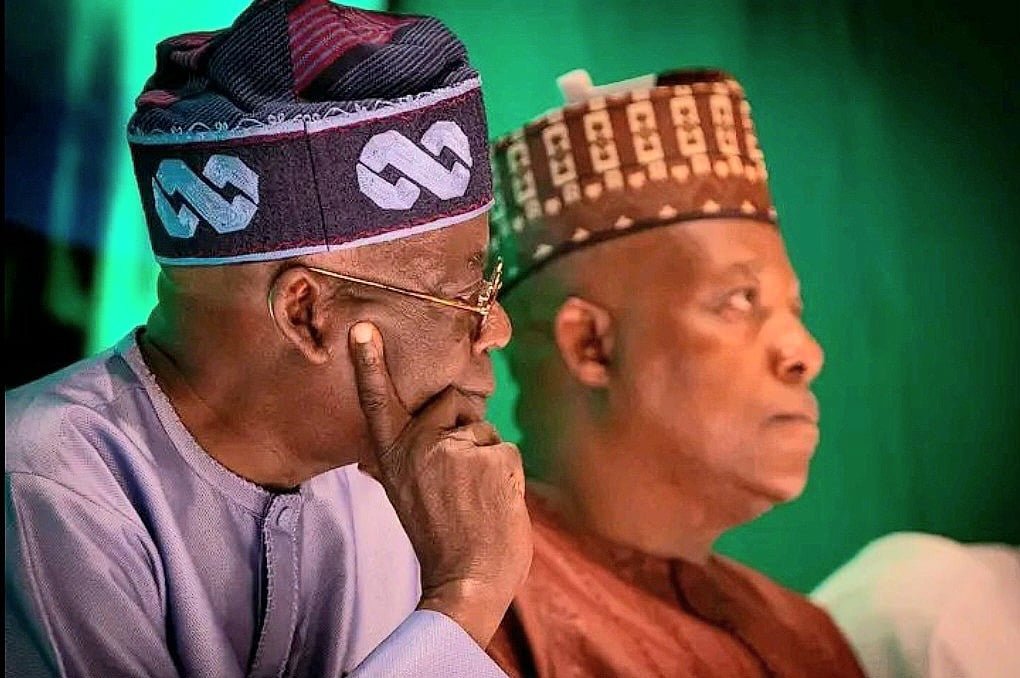
Courtesy: Opinion Nigeria
-By John Egbeazien Oshodi
The construction of the vice president’s residence, overseen by Wike at an enormous cost, brings forth a nuanced interplay between power, status, and public perception.
The opulent expenditure on a political figure’s residence amidst widespread poverty highlights the dichotomy between the rulers and the ruled, suggesting a possible disconnect between the governing elite and the everyday experiences of the populace.
The write-up provides a rich ground for a mental exploration, blending elements of reality with fantasy to delve, at face value or theoretically, into the minds of these political figures.
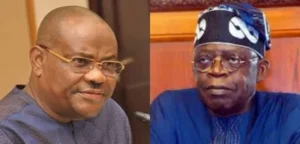
In the heart of Abuja, amidst the grandeur of Nigeria’s capital, a debate unfolds that encapsulates the deep divide between two contrasting ideals. Professor Mike Ozekhome, a rights activist and constitutional lawyer, stands before the audience, his voice a clarion call for change.
He speaks of the suffering that pervades the nation, a stark reality that he urges the government to confront with empathy and urgency. He noted, “Nigerians are suffering.
Nobody should deceive the president. There is mass poverty, degradation, and anger in the land. Don’t let your minders tell you otherwise. Disguise yourself one night, go out, and see the anger and hunger in the land.”
Nyesom Wike, Rivers state’s former governor and now the Minister of the Federal Capital Territory, responds with a tone that is both pragmatic and seemingly indifferent.
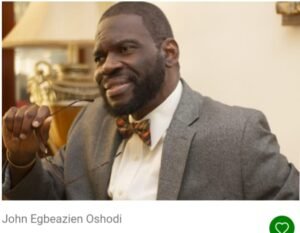
He acknowledges the hardships, yet his words—”Who does not know Nigerians are suffering? That is no longer a story”—strike a discordant note, suggesting a weary acceptance of the nation’s plight.
Wike’s statement is a reflection of the complexities he navigates. He recognizes the problem and the government’s role in addressing it, but his response is devoid of the passion and immediacy that Ozekhome’s critique warrants. Wike’s emphasis on the difference between theory and practice is a reminder of the gap between ideals and implementation, yet it also raises questions about the government’s commitment to bridging that gap.
The tension between Wike and Ozekhome is more than a clash of personalities; it is a microcosm of the broader struggle within Nigerian politics. Ozekhome’s call for action is a plea for a government that is in touch with the suffering of its people, while Wike’s response hints at the challenges of governance and the weight of expectations.
As Nigeria grapples with its myriad challenges, the debate between these two figures serves as a poignant reminder of the distance between acknowledging problems and enacting solutions. The onus is on Wike and the government to not only recognize the suffering but to transform that recognition into concrete actions that can bring about a better future for all Nigerians.
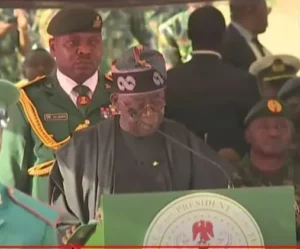
Mike Ozekhome’s passionate defense of the poor and critique of Nigeria’s democracy could be seen as a manifestation of an idealist archetype, embodying the collective frustrations and hopes of the marginalized populace. His questions about the nature of democracy reflect a deeper psychological struggle with disillusionment and the desire for genuine change. Professor Ozekhome stands as a bastion for the poor and democracy, challenging the established order and calling for a system that truly represents the people’s will.
On the other hand, Nyesom Wike’s defense of the government’s progress and focus on infrastructure symbolizes the pragmatic, perhaps more cynical perspective that sees power and wealth as necessary evils in the quest for stability and development. Wike’s stance represents the psychological defense mechanism of rationalization, where the shortcomings and moral compromises of the current system are justified by its perceived successes. Known for his political anger, stubbornness, and hunger for power, Wike’s confrontation with Ozekhome could be seen as more than just a clash of ideals; it may be a reflection of his deeper ambitions. His sudden focus on a residence left undone 14 years ago raises suspicions about his true motives.
In this context, what drives Wike’s actions? Are they simply about fulfilling a mandate, or is there a broader ambition at play? Is his emphasis on the vice president’s residence a sign of a strategic move in the complex chess game of Nigerian politics? The answers to these questions remain speculative, but they certainly add layers of intrigue to the ongoing political narrative.
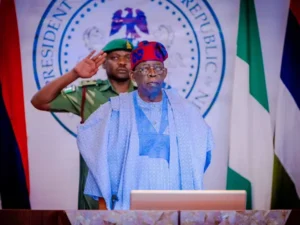
Vice President Kashim Shettima’s reassurances about President Tinubu’s health touch on themes of fear, uncertainty, and the need for strong, unwavering leadership. The public’s concern for Tinubu’s health could be seen as a reflection of their anxieties about the nation’s future stability and prosperity. Shettima’s call for unity and his emphasis on Tinubu’s intellectual and leadership capabilities over physical health resonate with the psychological need for a father figure who embodies wisdom and guidance. Yet, even in Shettima’s comments, there appears to be an underlying question—whether arising from genuine concern or another motive—that hints at the delicate nature of Tinubu’s health and the potential changes in power dynamics. Perhaps directing the media to Tinubu’s doctors would avoid any misinterpretations or undue speculation.
The construction of the vice president’s residence, overseen by Wike at an enormous cost, brings forth a nuanced interplay between power, status, and public perception. The opulent expenditure on a political figure’s residence amidst widespread poverty highlights the dichotomy between the rulers and the ruled, suggesting a possible disconnect between the governing elite and the everyday experiences of the populace. In a speculative light, Wike’s determination to complete the VP residence after years of neglect could be seen as more than just fulfilling a mandate. Some might wonder if Wike is preparing for a future where this residence could play a significant role, especially if Shettima were to ascend to the presidency amid concerns over Tinubu’s health.
President Tinubu’s symbolic importance, emphasized by Shettima, and the massive investment in the VP’s residence, hint at a possible yearning for legacy and continuity.
Tinubu is portrayed as an indispensable figure, a pillar of strength whose presence reassures the nation. Shettima’s consistent praise and admiration for Tinubu, to some, might seem unusually enthusiastic, leading to subtle speculations about his true intentions. This portrayal could be interpreted as a scenario where the stability of the state is tied to the persona of a single leader. However, while individual leaders are important, the emphasis should be on building stable institutions. As much as the nation values Tinubu’s leadership, there are subtle movements in the political landscape, with figures like Wike possibly envisioning their future roles in a changing political era.
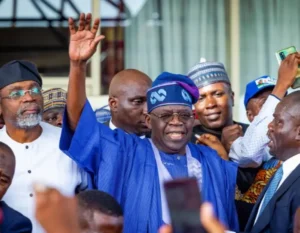
Is Wike fantasizing about being the VP for a future Shettima? This question opens a realm of political fantasy where ambitions and subconscious desires are projected onto the public stage. Is Wike’s significant role in working towards completing the VP’s residence and his visible support for the current administration despite different party affiliations reflecting a deeper, perhaps unspoken ambition to ascend to higher power? Could this ambition be viewed through the lens of psychological projection, where one’s aspirations are subtly communicated through actions and public displays of loyalty? Please note there is no attempt to psychologically assess any individual here. Wike and Shettima’s close relationship raises concerns about potential power plays, especially if Tinubu’s health deteriorates. Is there a possibility that Wike’s fantasy of becoming VP under a potential Shettima presidency looms large? It is a scenario that must be fervently prayed against.
In conclusion, these theoretical or possibly realistic elements weave a tapestry of potential psychological motivations, fears, and ambitions. By analyzing the characters through a theory-based psychological and fantastical lens, we can gain deeper insights into the underlying dynamics of power, leadership, and public perception in Nigeria’s political landscape. As I explore these suspicions, I hope that these possible fantasies do not come to pass. Tinubu’s steady hand is crucial to guiding us through these turbulent times, and we must ensure that the ambitions of power-hungry individuals do not derail our nation’s progress. May the potential underlying fantasies of those who wish to exploit the situation for their gain be thwarted, and may our nation remain strong. We wish good health and long life to Tinubu and hope he continues to have the physical and mental strength to grow our democracy.
Professor Ozekhome defends grassroots and democracy, Oga Wike aligns with the powerful, and Shettima’s periodic comments on Tinubu’s health leave room for speculation—are there possible hidden fantasies involved in all these narratives as noted in this writing? I think it makes sense to pray for Tinubu’s continued physical and mental strength and the stability of our nation. Only time will tell.
——
John Egbeazien Oshodi
Professor John Egbeazien Oshodi, born in Uromi, Edo State, Nigeria, is an American-based police and prison scientist, forensic psychologist, public policy psychologist, and legal psychologist. He’s a government advisor on forensic-clinical psychological services in the USA and the founder of the Dr. John Egbeazien Oshodi Foundation for Psychological Health. With a significant role in introducing forensic psychology to Nigeria through N.U.C. and Nasarawa State University, he’s also a former Secretary-General of the Nigeria Psychological Association. He’s taught at esteemed institutions like Florida Memorial University, Florida International University, Nova Southeastern University, and more, and is currently an online faculty member at Weldios University, Nexus International University, and Walden University. John.Oshodi@mail.waldenu.edu

